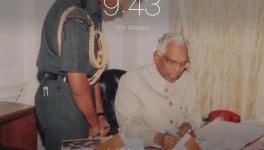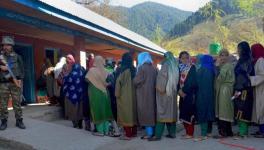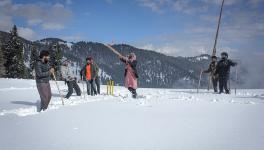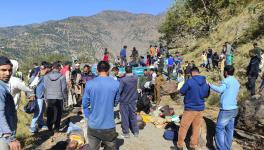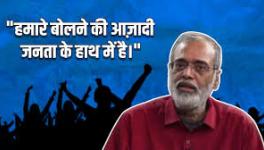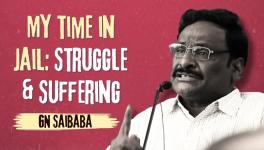That Eerie Friday Feeling: Kashmir Needs Healing
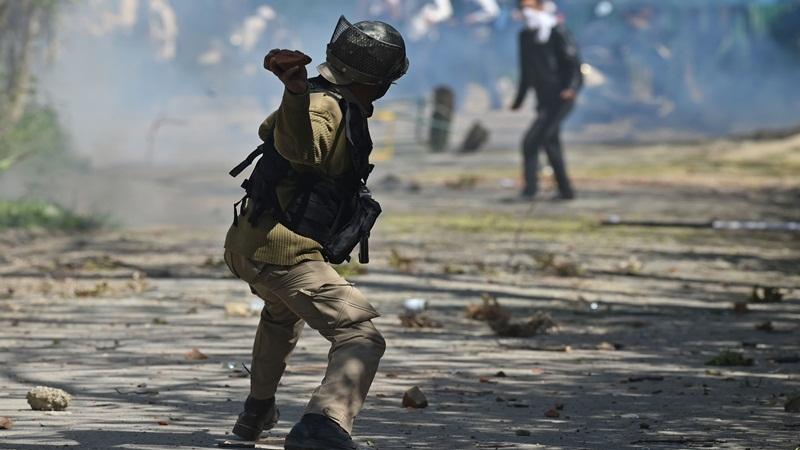
‘How do you like Kashmir?’ a group of locals surrounding me asked. I had just arrived in the valley. I was a little taken aback because of this doubt in their minds. Or maybe they were just testing my approval. ‘Why do you ask, the world knows Kashmir is one of the most beautiful places on earth. It is jannat!’ I said. They grinned, as if what I said just reaffirmed their belief. During my week-long stay, there was another refrain I heard constantly. ‘It is the media. The media is giving a bad name to Kashmir.
That’s why people have stopped coming,’ they said. ‘You’ve been here; tell us. Is there any problem?’ With a sweep of my arm I said, ‘Just look around, it is so beautiful.’ I was distracted by clouds spilling over into the valley over Pin Panjal range in the distance. It was a bit like a waterfall, in slow motion. Silhouetted against huge white clouds the poplars swayed gaily in the wind.
To my small, willow-fringed roadside audience in Duru, which does not normally figure on tourist itineraries, I said, “Look, I’ve come here to enjoy Kashmir’s famed beauty and have some peace of mind. Do you want me to bring my family to a place where I have to constantly watch out for hostilities? No.” That was the prime reason I was travelling alone, I told them. In fact, I will think over and over again before I decide to bring my family along. The people seemed to appreciate my point in a resigned sort of way. The next few days in Duru were eventless except for a solo three-kilometre trip to Verinag where a spring spouts blue-green water beneath a pristine mountain clothed with a thick deodar forest. The perennial spring, converted into a Mughal garden by Jahangir and later Shah Jahan, charges Rs 24 for entry per person – including Rs 4 as GST! I was pleasantly surprised to see that the Shiva temple close to the spring was being renovated. Sadly, Verinag, one of the first stopovers en-route to Srinagar, did not have a single tourist from mainland India.
In the valley, one thing has not changed over the years. They still ask you, ‘From India?’ Another disquieting opening question could be, ‘What are you?’ Meaning, whether you are a Hindu or a Muslim. Are Kashmiris hostile to visitors from across the Banihal pass? Not generally. But travelling alone outside the tourist trail can rouse suspicions. I met several locals who opened conversation thus: why are you here, where are you from. One guy probed further, how long I intended on staying. But, then this prying trait is dwarfed by the hospitality one comes across. I was surprised to see most Kashmiris opening their hearts and doors so easily. In Pahalgam, I was greeted cheerfully by a stranger. When I looked askance, he said, ‘I’m the horseman you had met in the morning. On your way to the taxi stand’. And then I remembered; in the morning, on my way to Aru, he was pestering me for a horse-ride. I took that trip to ‘little Switzerland’ in the evening with another horseman. And yet, Javed insisted on paying for the tea I ordered, and took me to his home where his wife made me kahwa and insisted that I stay back for dinner.
I can narrate at least three more incidents where people I was meeting for the first time took me to their homes, forcing a meal upon me. This is not to suggest that all is well in the valley of willows and running brooks. The openheartedness is more common in touristy areas like Srinagar and Pahalgam. In the smaller towns, one comes across a certain disquiet and suspicion.
I recall returning from Verinag to Duru in a taxi and when I told the driver to slow down a bit. He said, ‘It’s jumma, it’s better to get home in time’. Friday afternoon prayers, particularly after the azaan, take on an ominous form across the small towns of Kashmir. It’s not just the call of the muezzin coming from mosques in all conceivable directions that create a cacophony. It’s the after-namaz exhortations to the faithful way of life that often turns fiery and venomous. Not that I understood anything of the noise coming from mosques in all directions. But just the effect was so riotous, it gave me a feeling of being under siege.
Friday afternoons are like a war cry. When it ends, the pre-dusk silence feels ominous. I asked a local what it was they were screaming from the mosques. “They, the mullahs, are giving nasihat or sermons on the holy way of life,” he said. To me, an infidel, it gave goose bumps. Friday afternoons, even locals deem it wise to return home early. Mosque congregations often degenerate into anti-India tirades that end up as protests, hartals, stone pelting and sometimes shootings. Even if all this were not true, just the acoustics of riotous Friday ‘prayers’ can be an assault on your sensibilities, particularly if you are an outsider looking for quiet. The culmination into a bandh or a hartal only hurts the ordinary people who appear to have taken it in their stride. I remember landing up in Anantnag during a Friday shutdown. The bus-stand area, normally milling with people, wore an ominously deserted look. A local who gave me directions said, “It happens all the time, we have got used to it.” The man was outside his house, looking for a medicine shop, as his daughter was ill.
The craving for azadi (freedom) is what keeps these people going in the face of acute hardships. At a dinner in a Duru house, my host’s sons, constantly on their mobile screens, gave me news of how x number of doctors had given up their profession that morning for the cause. “There is one man who earned three lakhs a month. He has given it all up and joined the cause,” the boys said admiringly. I wondered why the three brothers were still struggling at their petrol pump jobs and not joining the cause. Apparently, with nothing to do, the cause becomes an attractive proposition. Many say the youth have taken to violence and hatred as they have no jobs.
A Kashmiri cop, wanting to keep me out of harm’s way, accompanied me for part of a road trek I was doing all alone. Chatting up, he said the same thing, that the youth had gone astray as there were no jobs. ‘You have a job that pays you a decent monthly salary, but deep down you also want azadi,’ I said. He looked taken aback for a moment and then nodded his head in the affirmative. Another forest guard laughed away at the question, “India has held this place for so long, they will never give up.” Ready acceptance for India cannot be brought about easily through job creation alone, although it was one dominant factor to wean away people from militancy. Locals often put the blame squarely on corrupt politicians, both Kashmiri as well as those from the Centre, for their plight. The state, which was the harbinger of Indian tourism, has missed out big time on the tourism boom.
Many know they have missed the bus, and have come to realize that azadi is a misplaced dream they will not be able to see in their lifetimes. It is these moderate voices that the government needs to talk to. The Centre must also engage with a large section of the population that has a stake in India, the young shawl-sellers who make their annual pilgrimage to towns even south of Chennai, the apple merchants who visit the Sabzi Mandi in Delhi during the season. To some extent, the Kashmiri youth can be won over by increasing the number of jobs for them. Already the railway line, from Baramullah to Banihal, appears to have made some inroads into the hearts of Kashmiris. I recall a local from Duru telling me proudly, “We will soon have an AIIMS-like facility in our neighbourhood.” Such investments should be seen as confidence-building measures. This may or may not yield expected results soon, but they have a goodwill effect in the long term. Currently, the valley remains unpredictable, dictated by the whims of the hardliners. They exploit the fact that at heart many Kashmiris are still not reconciled to being part of India. Not surprisingly, you see many young men wearing black T-shirts with the slogan ‘I’m Kashmiri’ emblazoned across their chest. That sentiment can only be overcome with love and hearing out their grouses, some real, many imagined. Kashmiris deserve a healing touch.
(Ashim Choudhury is author of The Sergeant’s Son)
Get the latest reports & analysis with people's perspective on Protests, movements & deep analytical videos, discussions of the current affairs in your Telegram app. Subscribe to NewsClick's Telegram channel & get Real-Time updates on stories, as they get published on our website.









